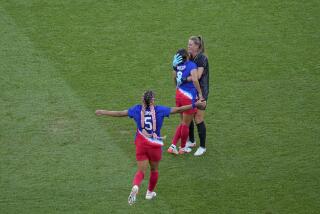Twin Sister Shares in the Victory
- Share via
There was an emotional and memorable moment after the expected U.S. women’s basketball victory in the gold medal game against South Korea.
USC star Cheryl Miller, who had told reporters she had feared not making the U.S. team, led the way in the final, with 16 points, 11 rebounds and five assists. But it was another USC star -- two actually -- who captured the moment during the medal ceremony. Pam McGee had made the U.S. team, but her twin sister, Paula, part of the three-sided attack that made the Trojans a women’s basketball powerhouse, did not.
So when Pam received her gold medal, she walked off the podium and across the floor to where Paula was watching and hung the medal around Paula’s neck. Paula, and millions watching at home, cried.
There was another women’s sports drama on the L.A. Olympic horizon, one that would eventually eclipse the scene after the women’s basketball medal.
The race for the women’s 3,000 meters was among the most anticipated events of these Games. It had many story lines.
One of the favorites was veteran American distance runner Mary Decker, who had a handful of records and a world-class running reputation but no Olympic hardware. When the Soviet bloc announced its boycott, Decker’s chances seemed that much better because one of her main competitors was expected to be Romania’s Maricicia Puica. Peter Ueberroth quickly talked Romania into showing up, and Decker’s job was, again, a tough one.
Also, there was Zola Budd, an 18-year-old, 85-pound, barefoot-running farm girl from South Africa, who had come out of nowhere to run times that were blowing away the international running elite.
Not only was Budd an enigma, but she was one wrapped in controversy. Since the apartheid politics of her country did not allow it to enter a team in the Olympics, Budd had sought British citizenship to be eligible to compete. And, to the amazement of most of the British empire, this was granted in a record 13 days.
So Budd, totally unprepared and ill-equipped to handle such an international spotlight, became a huge story well before her Friday night medal showdown with Decker and Puica.
Betty Cuniberti of The Times quoted Budd as saying, “Some days, I wake up and wish the world weren’t watching me.”
But it was, to ridiculous excess.
Elsewhere, the Games were creating the usual flow of Olympic stories.
Swimmer George DiCarlo, asked to comment about the collapse of marathon runner Gabriela Andersen-Scheiss from heat exhaustion, recalled that he had once run a marathon with almost no training. It took him 4 1/2 hours, he said, and when he collapsed across the finish line, he was asked whether he needed treatment. He responded, “No, just drag me over to that Coors truck.”
Australian Pat Cash, who would win the Wimbledon title in 1987, got bounced out of the Olympic tennis event early and said he hadn’t trained much and it didn’t matter a lot to him because tennis wasn’t a real medal sport, just a demonstration.
Boxer Evander Holyfield knocked out Kenya’s Syivaus Okello with a punch described by The Times’ Earl Gustkey: “He hit Okello’s chin so hard with a left hook that you could hear it out on Figueroa Street.”
In sailing, Rich Roberts captured the essence of a good day by not mentioning the words “controversy” or “disqualification” until the 20th paragraph of a 22-inch story.
More to Read
Go beyond the scoreboard
Get the latest on L.A.'s teams in the daily Sports Report newsletter.
You may occasionally receive promotional content from the Los Angeles Times.







